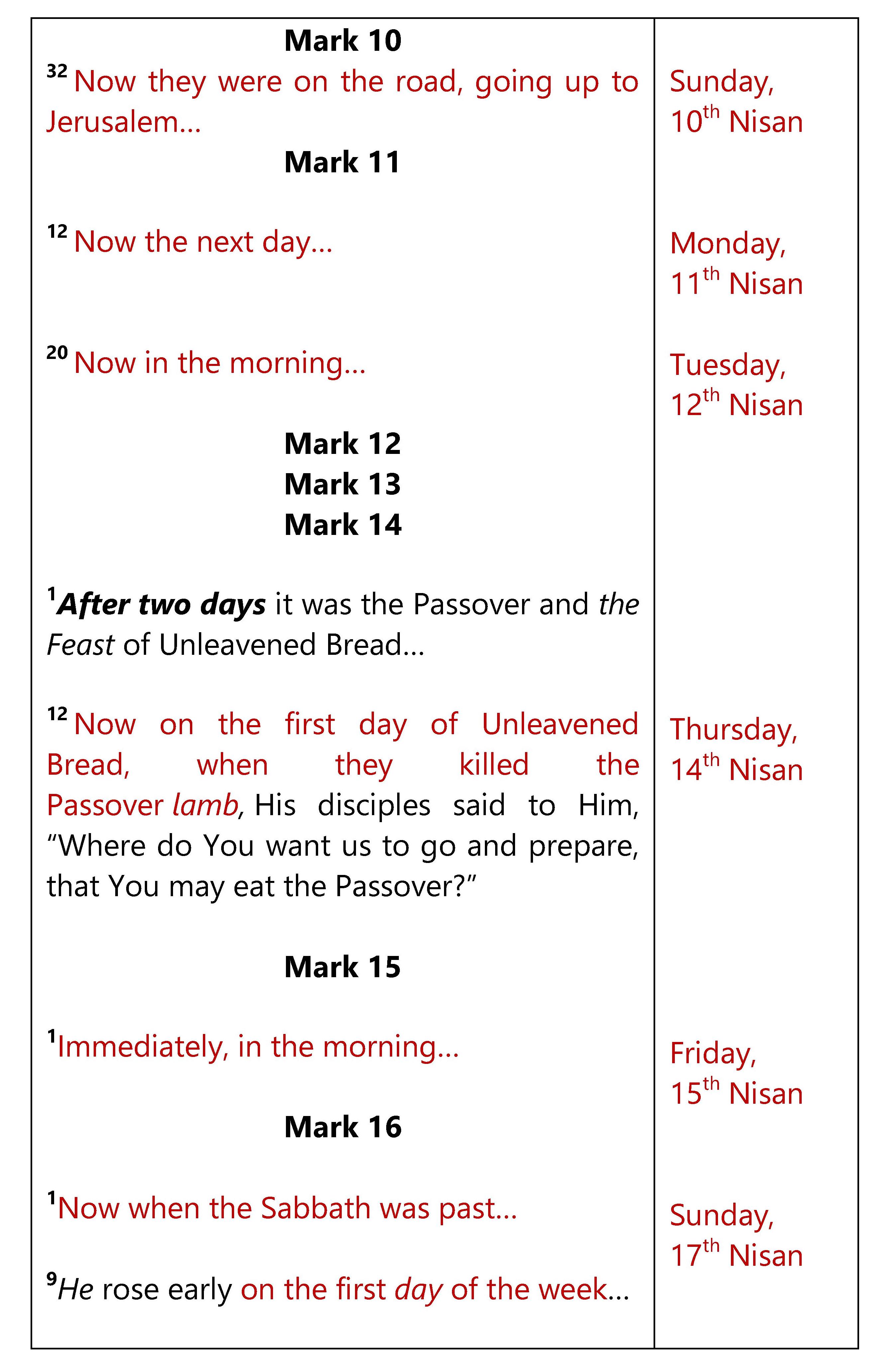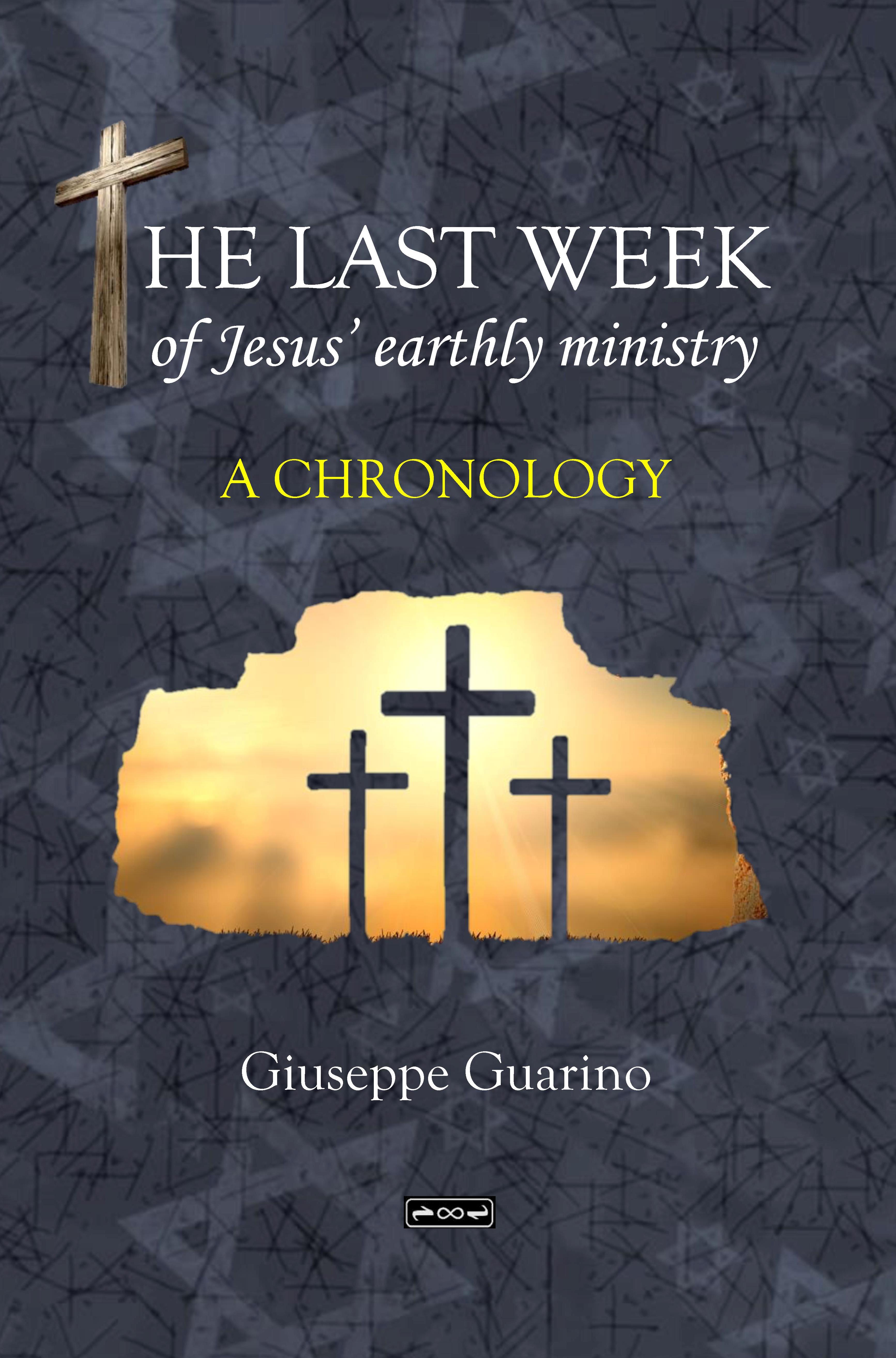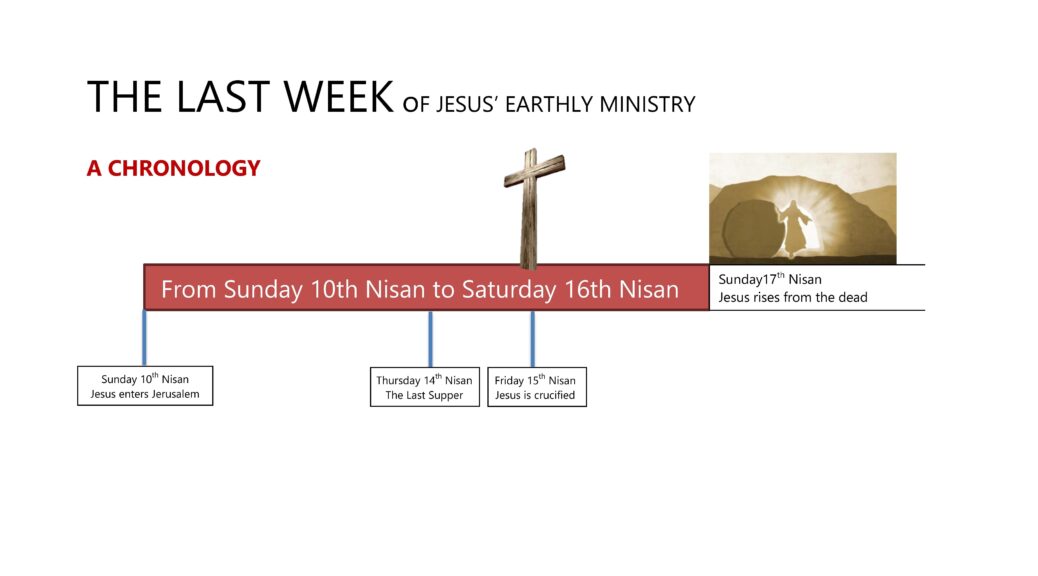by Giuseppe Guarino
The last week of Jesus’ earthly ministry was spent in Jerusalem.
The gospels dedicate a lot of their narratives to this period of time. But which account presents the events in a way that permits us to reconstruct a chronology?
The answer is Mark.
What about the other accounts?
When I studied the book of Daniel and wrote about it, I mentioned its chronological disorder – not to mention his bilingual text that further complicates the matter. The first six chapters are chronological. Though chapter six ends with the Persians ruling the land, chapter 7 goes back to the time when the Babylonians were in power. It is no mistake: there is a literary and spiritual intent in what the author does.
I invite the reader to consider the book of Jeremiah too. There no retraceable chronological order will be found: time is secondary. The “when” matters much less than the “what” and so events are recorded in an order that unfolds their spiritual meaning.
Speaking about our gospels.
It is true that John has more information about the last week than the synoptic Gospels. But at the same time it mentions of the cleansing of the temple at the beginning of his Gospel, instead of during the last week. I am convinced that intent became more important in the fourth gospel than chronology.
So, a discrepancy in the order of events is seen in the fourth gospel. Some try to harmonize it saying that there were two cleansing of the temple, one at the beginning of Jesus’ ministry, the other one near the end. But this is not a good solution. In fact, this way the gospel of John will be the only one mentioning three Passovers, while the other gospels only mention too. Also, the inconsistency of the two possible cleansing events is quite evident.
The answer to positioning this event at the beginning of this narrative is connected to the intent of the writer.
I believe there is one simple key to understanding these seeming “inconsistency” and others. In fact, if we consider the gospel of John written to be read in public during separate sections, it will all seem evident.
The same John had declared blessed the reader (one) and the hearers (a group). Even if you do not believe the same John to have written the Gospel and Revelation, the reference speaks of a common practice in the early church: extensive reading of a biblical book. At the time manuscripts were expensive and most church members (the same thing happened in the synagogues) could not own biblical manuscripts.
See also 1 Thessalonians 5:27, “I charge you by the Lord that this epistle be read unto all the holy brethren.”
Colossians 4:16 may be another good reference to this.
Let us examine one thing which really surprised me when reading John.
In John 6:8 we read: “One of his disciples, Andrew, Simon Peter’s brother, saith unto him,”
Why did the author need to clarify here something which he already spoke of in John 1:40, “…Andrew, Simon Peter’s brother.”
Many similar instances could be added.
To us, reading from a nice leather bound Bible, in the comfort of our living room, such could look like a very strange repetition. Even annoying.
Yet, the above mentioned peculiarities make perfect sense if we imagine that the gospel was meant to be read and listened to during separate sections. That is also why it is not a discrepancy if Jesus cleanses the temple in a reading section of the Gospel rather that in another – not if the author has something specific in mind to teach during that session.
The same event is misplaced chronologically by Matthew too.
Mistake or intent?
Intent, no doubt. In Matthew it was important to position that event right after the triumphal entry of Jesus in Jerusalem. The amazing, deep topical order of this Gospel required absolute preeminence over chronology.
In Mark 11:1-11 Jesus enters Jerusalem. He even enters into the temple and looks around. Then in the evening he goes to Bethany. The morning after, on his way from Bethany to Jerusalem, he is hungry but finds to fruits to eat in the fig tree and curses it – 11:12-14. Then he goes into Jerusalem and in the temple and purifies it – 11:15-18.
In Matthew 21:1-11 Jesus enters Jerusalem. He goes into the temple and purifies it 21:12-16. Then in the evening goes to Bethany – 21:17. The morning after, on his way to Jerusalem finds a fig tree and curses it – 21:18-22. From verses 23 and following he is in the temple.
Matthew is a gospel written for the Jewish mind to prove that Jesus is the Christ, the Messiah. The discontent of God over the religious conduct of Israel and the end of their national privileges because they reject the Messiah is a key theme. “Therefore say I unto you, The kingdom of God shall be taken from you, and given to a nation bringing forth the fruits thereof.” (Matthew 21:43)

The main events
Jesus enters the city of Jerusalem welcomed by the people as a king (Mark 11:10) fulfilling the words of the prophet Zechariah 9:9 spoken centuries before.
On the first day of the Unleavened Bread, which was Thursday 14th Nisan, he eats his Last Supper with his disciples. We know the day fits perfectly into the chronology of Mark because of the statement in Mark 14:1 made on Tuesday 12th Nisan.
Jesus was crucified on Friday 15th Nisan.
He rose on Sunday, 17th Nisan.
We do not know the year. Quite probably it was 29 AD. But there is no conclusive evidence or any way to retrace this in the biblical accounts. The problem is not the Bible, but some imprecisions in our calendar.
How do we build this chronology?
Mark 14:1 and 12 make specific mention of the Feast of Unleavened Bread (v.1) and the killing of the Passover lamb (v.12).
In Exodus 12:17-18, we read,
“17 So you shall observe the Feast of Unleavened Bread, for on this same day I will have brought your armies out of the land of Egypt. Therefore you shall observe this day throughout your generations as an everlasting ordinance. 18 In the first month, on the fourteenth day of the month at evening, you shall eat unleavened bread, until the twenty-first day of the month at evening.“
Knowing that Mark 14:1 and 12 must be Thursday 14th Nisan, the first day of the Hebrew calendar, the rest is a consequence.
Significantly, Jesus enters Jerusalem on Sunday, 10th Nisan. It had a deep theological meaning.
Exodus 12:1-3, “ 1 Now the Lord spoke to Moses and Aaron in the land of Egypt, saying, 2 “This month shall be your beginning of months; it shall be the first month of the year to you. 3 Speak to all the congregation of Israel, saying: ‘On the tenth of this month every man shall take for himself a lamb, according to the house of his father, a lamb for a household.”
On that 10th day of the first month, entering Jerusalem, Jesus, the Son God, made himself available as the Lamb of God.
It did not happen by chance. In fact, on that same day, as he headed for the holy city, he openly declared to his disciples: “32 Now they were on the road, going up to Jerusalem, and Jesus was going before them; and they were amazed. And as they followed they were afraid. Then He took the twelve aside again and began to tell them the things that would happen to Him: 33 “Behold, we are going up to Jerusalem, and the Son of Man will be betrayed to the chief priests and to the scribes; and they will condemn Him to death and deliver Him to the Gentiles; 34 and they will mock Him, and [e]scourge Him, and spit on Him, and kill Him. And the third day He will rise again.”” (Mark 10:32-34)
Everything had been preordained from the foundation of the world, to save man from sin and reconcile him back to God.
Exodus 12:6, “Now you shall keep it until the fourteenth day of the same month. Then the whole assembly of the congregation of Israel shall kill it at twilight.”
When Jesus ate the Passover with his disciples, the reference to Exodus 12 was clear. In fact Jesus speaks of a new “covenant” where the blood to seal it was his!
Mark 14:22-25, “22 And as they were eating, Jesus took bread, blessed and broke it, and gave it to them and said, “Take, eat; this is My body.” 23 Then He took the cup, and when He had given thanks He gave it to them, and they all drank from it. 24 And He said to them, “This is My blood of the new covenant, which is shed for many.”
Saying “take, eat, this is my body” and “this is my blood,” he explained to them that the things actually spoken of in the old covenant were written concerning him.
The Gospels say nothing of the lamb being eaten that night, since Jesus was the lamb and his was the blood of the New Covenant.
“26…but now, once at the end of the ages, He has appeared to put away sin by the sacrifice of Himself. 27 And as it is appointed for men to die once, but after this the judgment, 28 so Christ was offered once to bear the sins of many. To those who eagerly wait for Him He will appear a second time, apart from sin, for salvation.” (Hebrews 9:26-28).
Chronology is important for us today. It was not so in the Bible. Perhaps this is a lesson too. Perhaps we cannot be so interested in knowing the facts only, but we need to understand their meaning above all.
What happened that last week of Jesus’ ministry changed the world, the lives of many – it can change our life too. God made a new covenant available, sealed by the blood of His Son.
“He (Jesus) is the Mediator of the new covenant” (Hebrews 9:15)
A covenant where the Law is written in the heart and the relationship with the Father is sealed by the indwelling presence of the Holy Spirit.
It was prophesied centuries before by Jeremiah and Ezekiel.
“33But this is the covenant that I will make with the house of Israel after those days, says the Lord: I will put My law in their minds, and write it on their hearts; and I will be their God, and they shall be My people.” (Jeremiah 31:33)
“26 I will give you a new heart and put a new spirit within you; I will take the heart of stone out of your flesh and give you a heart of flesh. 27 I will put My Spirit within you and cause you to walk in My statutes, and you will keep My judgments and do them.” (Ezekiel 36:26-27)
This has been made possible by the perfect redemption in the blood of Jesus Christ – it all happened during that last week in Jerusalem.
I conclude with perhaps the greatest opportunity (invitation) offered in the Bible.
“11 He came to His own, and His own did not receive Him. 12 But as many as received Him, to them He gave the right to become children of God, to those who believe in His name: 13 who were born, not of blood, nor of the will of the flesh, nor of the will of man, but of God.” (John 1:11-13)
Coming Soon
 |

